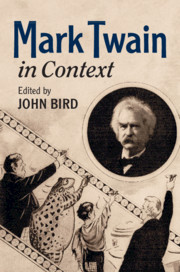Book contents
- Mark Twain in Context
- Mark Twain in Context
- Copyright page
- Contents
- Figures
- Contributors
- Preface
- Acknowledgments
- Chronology
- Abbreviations
- Part I Life
- Part II Literary Contexts
- Chapter 5 Southwestern Humor
- Chapter 6 Literary Comedians
- Chapter 7 Local Color and Regionalism
- Chapter 8 Early Periodical Writing
- Chapter 9 Travel Writing
- Chapter 10 Short Fiction
- Chapter 11 Publishing
- Chapter 12 Lectures and Speeches
- Chapter 13 Contemporary Writers
- Chapter 14 Realism and Naturalism
- Part III Historical and Cultural Contexts
- Part IV Reception and Criticism
- Part V Historical, Creative, and Cultural Legacies
- Further Reading
- Index
- References
Chapter 12 - Lectures and Speeches
from Part II - Literary Contexts
Published online by Cambridge University Press: 12 December 2019
- Mark Twain in Context
- Mark Twain in Context
- Copyright page
- Contents
- Figures
- Contributors
- Preface
- Acknowledgments
- Chronology
- Abbreviations
- Part I Life
- Part II Literary Contexts
- Chapter 5 Southwestern Humor
- Chapter 6 Literary Comedians
- Chapter 7 Local Color and Regionalism
- Chapter 8 Early Periodical Writing
- Chapter 9 Travel Writing
- Chapter 10 Short Fiction
- Chapter 11 Publishing
- Chapter 12 Lectures and Speeches
- Chapter 13 Contemporary Writers
- Chapter 14 Realism and Naturalism
- Part III Historical and Cultural Contexts
- Part IV Reception and Criticism
- Part V Historical, Creative, and Cultural Legacies
- Further Reading
- Index
- References
Summary
The second half of the nineteenth century was a golden age of lecturing and speeches, and Mark Twain established himself as one of the most popular lecturers and speakers of his time. Throughout the country, there was a wide network of speakers on religion, culture, social issues, literature, and the arts. Twain first gave lectures in the late 1860s, and he returned to the lecture circuit when he needed money or when he was touting a new book, as he did in his 1884-85 lecture tour with George Washington Cable, which covered the Northeast and Midwest for over four months and thousands of miles. When he declared bankruptcy in the 1890s, his around-the-world lecture tour allowed him to pay off his debts in full, as well as to further spread his international reputation. He had a command of the stage and the audience that was gripping, eliciting riotous laughter, but also making people think about his comic but often acerbic comments on a variety of subjects.
- Type
- Chapter
- Information
- Mark Twain in Context , pp. 119 - 129Publisher: Cambridge University PressPrint publication year: 2020



